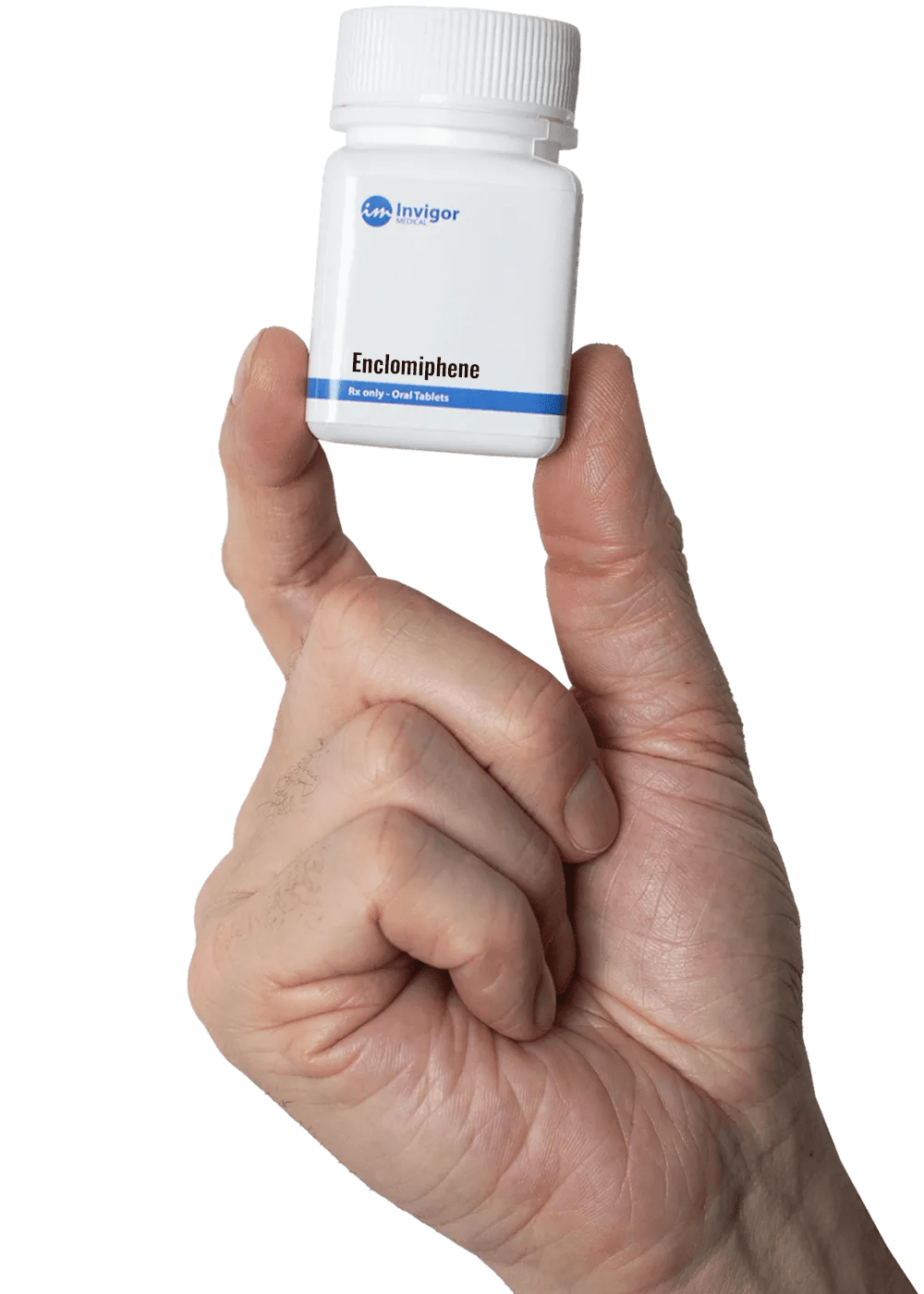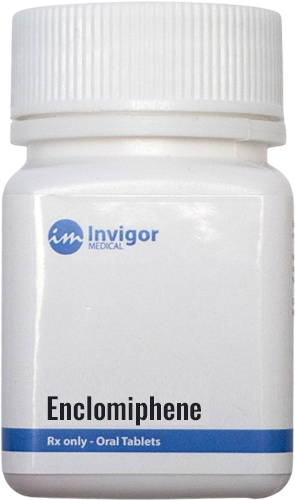Up to five million men in the U.S. have low testosterone levels. Low testosterone levels, or hypogonadism, can cause sexual, psychiatric, and physical symptoms, but research suggests that only one in every 20 men with low testosterone levels seeks treatment.1,2
Testosterone replacement therapy (TRT) has been available for decades, but it decreases sperm production and fertility. This is a hard stop for men wanting to father children in the near future. TRT can also cause testicular shrinkage, mood changes, and severe acne.
Enclomiphene citrate can boost testosterone levels without affecting fertility. Enclomiphene stimulates your body to produce testosterone. By working with your body’s natural feedback loops, enclomiphene typically has fewer health risks and side effects.
Table of Contents
How does enclomiphene work to increase testosterone levels (according to studies)?
Yes, enclomiphene citrate is an off-label treatment for low testosterone. It is one of the two isomers found in Clomid (clomiphene), a medication that has been commercially available since the 1960s. The other isomer in Clomid is zuclomiphene.2

How does enclomiphene work to increase testosterone?
When testosterone levels increase, the enzyme aromatase converts some testosterone to estrogen. Aromatase is active in fat cells. Increased estrogen levels block the release of follicle-stimulating hormone (FSH) and luteinizing hormone (LH) from the pituitary gland.
FSH and LH stimulate testosterone and sperm production.
Enclomiphene citrate is an estrogen receptor agonist. It binds to estrogen receptors and blocks estrogen from binding to its receptors in the pituitary gland. When estrogen cannot bind to its receptors in the pituitary gland, FSH and LH production increase. Increased LH and FSH production increases testosterone production in the testes.3
Enclomiphene citrate decreases the effect of estrogen and increases testosterone production.
In two simultaneous Phase 3 clinical trials, 256 adult men with low testosterone levels (2 morning testosterone levels below 300 ng/dL) and who were either overweight or had obesity took either enclomiphene (6.25 mg or 12.5mg) or testosterone (Androgel) daily for six weeks.
Results:4
- Testosterone levels increased in the enclomiphene and testosterone groups, but not in the placebo group.
- LH increased in the enclomiphene groups and decreased in the testosterone group.
- FSH increased in the enclomiphene groups and decreased in the testosterone group.
- Sperm counts were maintained in the enclomiphene group and decreased in the testosterone group.
- Testosterone level variation throughout the day was maintained in the enclomiphene groups but not in the testosterone group.
Enclomiphene does not have the same effect on the pituitary gland and sperm production as testosterone does.
TRT suppresses pituitary function and sperm production. Enclomiphene stimulates FSH and LH production and maintains sperm production.4
These results align with those found in other studies comparing enclomiphene to testosterone and Clomid.5,6,8

How long does it take for enclomiphene to work?
In a Phase 2 study, researchers tracked testosterone and LH levels every hour in 42 men with hypogonadism who took either enclomiphene or transdermal testosterone for six weeks.
Men who had significantly low total testosterone levels at baseline had significant increases in their testosterone levels after taking enclomiphene for two weeks.
Average testosterone levels increased in men taking both enclomiphene and testosterone by six weeks.
Enclomiphene’s effect on LH and total testosterone persisted for at least one week after treatment was stopped.7
While research is not available specifically on using enclomiphene to increase testosterone levels, researchers estimate that it takes days to weeks for most testosterone replacement benefits.9
| Benefits of Testosterone Replacement | Estimated Time to See This Effect |
|---|---|
| Increased insulin sensitivity | a few days |
| Improved libido and erectile function | 3 to 6 weeks |
| Increased energy, mood, and vitality | 3 to 6 weeks |
| Increased lean body mass | 12 to 16 weeks |
| Reduced abdominal fat mass | 12 to 16 weeks |
| Increased bone density | 6 months |
| Increased muscle strength | 12-16 weeks |
| Reduced blood glucose | 3 to 12 months |
How much can enclomiphene increase testosterone levels?
More studies with larger populations are needed to determine how much enclomiphene increases testosterone levels and how long it takes to do so.
In the Phase II study that enrolled 48 men, testosterone levels were below 350 ng/dL at the start of the study, and mean testosterone levels after six weeks of treatment were 604 ng/dL in men treated with enclomiphene and 500 ng/dL in men treated with testosterone.7
In the phase III study that enrolled 256 men, testosterone levels were less than 300 ng/dL at the start of the study. Testosterone levels increased to 400 mg/dL after two weeks of treatment and stabilized at 450 mg/dL after that.4

What should I expect when taking enclomiphene?
Men with low testosterone levels who are good candidates for enclomiphene therapy should have an increase in their testosterone levels.
Low testosterone levels can cause the following symptoms:
- Decreased sex drive
- Decreased sperm count
- Erectile dysfunction
- Loss of muscle mass and strength
- Increased abdominal fat
- Decreased energy levels
A low testosterone level can have a significant effect on a man’s quality of life. Enclomiphene therapy can reverse this.
The most common side effects people reported when taking enclomiphene include:11
- Headache (3.3%)
- Hot flushes (1.7%)
- Muscle spasms/joint pain (1.2%)
- Nausea (2.1%)
- Cold symptoms (1.7%)
- Diarrhea (1.9%)
Does enclomiphene cause muscle growth?
Enclomiphene increases FSH and LH levels. With increased LH and FSH production, the testes produce more testosterone. Restoring testosterone to healthy levels can boost muscle mass and muscle strength.
Talk with a treatment specialist at Invigor Medical to learn more about the enclomiphene treatment process. After a consultation with a medical provider and appropriate lab work, men with symptomatic low testosterone levels may be eligible for prescription enclomiphene therapy.










